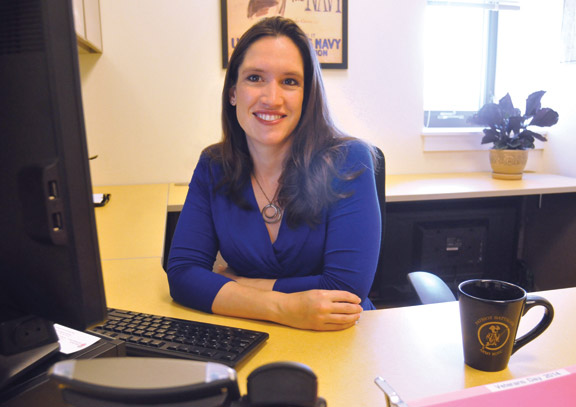During breaks from eavesdropping on Iraqi insurgents’ phone calls for the National Security Agency (NSA), Karen McNeil read Arabic poetry. She was partial to erotic love poems by a contemporary Syrian writer and to a Palestinian author who focuses on the anguished plight of his people.

“There weren’t a lot of other people at the NSA like me,” she says. But it did suggest that McNeil would be perfect for her new job at Brown bridging the worlds of academia and the military.
In July, McNeil became program director for the Office of Student Veterans and Commissioning Programs, which was created by former President Ruth Simmons in 2011. Given the absence of ROTC on campus, Simmons believed the program would be an alternate way of meeting the needs of students planning a military career.
McNeil’s constituents include Brown ROTC students (who are trained on other campuses), veterans enrolled in the RUE program, and alumni who have served in the military. (Brown has fewer than three dozen students who are either vets or in military training.) In addition to offering advice, assistance, and support to students, McNeil will try to improve relations with alumni alienated by the University’s position on ROTC, which goes back to a 1969 faculty vote.
“I want these alumni to know that Brown recognizes the issues they’ve raised,” McNeil says.
McNeil grew up in California’s Central Valley and earned a degree in history and Spanish from Wellesley in 2000. She worked in public relations in San Francisco for two years but found it wasn’t for her. “I’m not really a sales-y kind of a person,” she says.
Then she heard about a U.S. Navy program that offered foreign language training as preparation for foreign intelligence work. “It sounded like fun,” McNeil says. She chose to learn Arabic. First came eight weeks of boot camp in Great Lakes, Illinois, then a year and a half at a language training institute in Monterey, California. Although she chose Arabic on a whim, she says, “Once I started learning it, I got really into the language.”
After finishing her coursework, the navy sent McNeil to work for the NSA in Georgia. The Iraq war was in full swing, so she listened in on the conversations of Iraqis fighting the United States. Later, she moved to the NSA’s headquarters in Maryland, where she monitored electronic conversations during the Arab spring. After leaving the military in 2011, she earned a master’s in Arabic at Georgetown. Her husband, Miled Faiza, is a poet and translator who teaches Arabic at Brown.
McNeil sees her office as offering “one-stop shopping” for students. She helps them navigate the bureaucracy at the veterans affairs department in Washington, D.C. and make sense of their financial aid and health benefits. She also coordinates their academic schedules with their military obligations and advocates for them with the administration.
McNeil wants to foster a greater understanding among ROTC students, veterans, and Brown’s larger student body. “There are certain stereotypes about people who serve in the military,” she says. They’re assumed to be conservative or aggressive, when, McNeil says, “there’s huge diversity in the military.”
McNeil will also be recruiting more veterans to apply to Brown. “A lot of veterans feel like Brown isn’t a place for them,” she says. “We have a moral responsibility to serve the people who have served the nation.”





